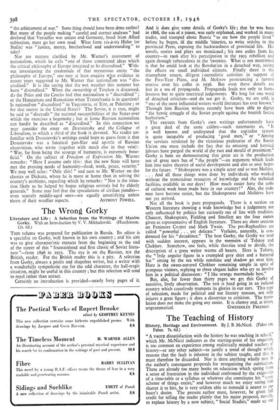The Wrong Gorky
Tim volume was prepared for publication in Russia. Its editor is a specialist on Gorky, well known in his own country ; and his aim was to give characteristic extracts from the beginning to the end of the career of this " fountainhead and first classic of Soviet litera- ture "—from 1896 to 1935. The eye is on the Russian, not the British, reader. For the British reader this is a pity. A selection from Gorky, always a prolix and shapeless writer, but a writer with a wonderfully sympathetic eye for the odd character, the half-tragic situation, might be useful in this country ; but this selection will tend to repel rather than attract.
Certainly an introduction is provided—nearly forty pages of it.
And it does give some details of Gorky's life ; that he was born in 1868, the son of a joinef, was. early orphaned, and worked in many trades, and tramped about Russia " to see how the people lived " before he began, in the middle 'nineties, to write articles in the provincial Press, exposing the backwardness of provincial life. His novels, stories and plays are mentioned ; his two exiles from his country—in 1906 after his participation in the 1905 rebellion and again through tuberculosis in the 'twenties. What is not mentioned is that he could look at the Revolution in a detached way, seeing the effects on small individual citizens. Finally there is the triumphant return, diligent j ournalistic activities in support of the Five-Year . Plans, and M. Molotov pronouncing a funeral oration over his coffin in 1936. But even these details are lost in a sea of propaganda. Propaganda leads not only to form- lessness but to quite uncritical judgements. We long for one word of detached criticism—and do not get it. Gorky, we are told, is "one of the most influential writers world literature has ever known." Through him Russian writers recently have been able to dice " the heroic struggle of the Soviet people against the brutish fascist barbarians."
The extracts from Gorky's own writings unfortunately have a great deal of the same calibre—such statements as, " It is well known and undisputed that the capitalist system is quite incapable of producing good men,' " or " Among the services rendered by the victorious proletariat of the Soviet Un'on one must include the fact that its amazing and heroical labours have purged the world of the rust and mould of pessimism." Gorky is bent on demonstrating that great art is the production not of great men but of " the people "—an argument which leads him into naïve theories of social development and also to rosy hopes for the future. " Shakespeare was a simple actor and so was Moliere. . . . And all these things were done by individuals who worked without the tremendous resources of knowledge and the technical facilities available in our days! How much easier have the tasks of cultural work been made here in our country!" Alas, the tasks may have become easier, but the Shakespeares and Molieres have not yet arrived.
Not all the book is pure propaganda. There is a section on Western literature showing a wide knowledge but a judgement not only influenced by politics but curiously out of line with tradition. Chaucer, Shakespeare, Fielding and Smollett are the four names given as representative of English literature. There are short sections on Fenimore Cooper and Mark Twain. The pre-Raphaelites are called " powerful . . . yet delicate." Verlaine, naturally, is con- demned for his "decadence." The best Gorky; the Gorky we read with sudden interest, appears in the memoirs of Tolstoy and Chekhov. Somehow, .one feels, while thecries tend to divide, the description of a 'great writer warms all hearts. Here is Tolstoy, the " little angular figure in a crumpled grey shirt and a battered hat" sitting by the sea while sunshine and shadow go over him. Here is the sweet-natured Chekhov remaining simple in spite of pompous visitors, replying to three elegant ladies who try to involve him in a political discussion: " I like orange marmalade best." But, alas, for fewer than thirty pages we get this Gorky of sensitive, lively observation. The rest .is hard going in an isolated country which ceaselessly trumpets its glories in our ears. This type of selection, made for political and not literary reasons, not only injures a great figure ; it does a disservice to criticism. The trans- lation does not make the going any easier. It is clumsy and, at times,






























 Previous page
Previous page